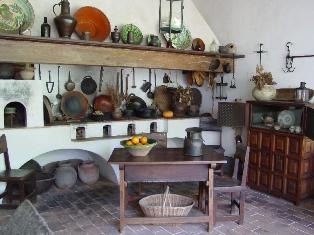September 3, 2008 ·
Written by Lori Thiessen
Some of you may be familiar with the Japanese Tea Ceremony. But how many of you are familiar with the Ethiopian Coffee Ceremony?
I’d never seen it or heard of it until I stumbled across the article by Emily Doyle, Ethiopian Coffee Ceremony. The ceremony that Doyle outlines has the ritualized care and attention we associate with the Japanese Tea Ceremony.
It begins with a young woman dressed in traditional Ethiopian clothes. The equipment used to make the coffee is reverently brought on scented grasses. Then the washed green coffee beans are placed in the coffee roasting pan and cooked over a small open fire. The roasted beans are then presented to the participants to smell the wonderful aroma. A mortar and pestle are used to pound the beans into coffee powder.
Boiling the powder and water takes place in a coffee pot which is called jebena. Since the elaborate coffee pot does not have a filter, the boiled coffee is poured through a finely woven cloth.
Tiny china cups receive this lovingly prepared liquid. The young woman with practiced hand pours the coffee out in thin stream from quite a height. The coffee is drunk with a quantity of sugar stirred in but no milk is added.
The ceremony is traditionally performed three times per day, morning, afternoon and evening. The preparation of the coffee takes about ½ hr and traditionally three cups of coffee are drunk at a sitting.
But the three cups are not just plain old joe. Each serving is named. The first is Abol, the second, Tona and Baraka is the third. The last cup is especially important to drink because according to Ethiopian culture, the third cup contains a blessing.
Written by Lori Thiessen
Some of you may be familiar with the Japanese Tea Ceremony. But how many of you are familiar with the Ethiopian Coffee Ceremony?
I’d never seen it or heard of it until I stumbled across the article by Emily Doyle, Ethiopian Coffee Ceremony. The ceremony that Doyle outlines has the ritualized care and attention we associate with the Japanese Tea Ceremony.
It begins with a young woman dressed in traditional Ethiopian clothes. The equipment used to make the coffee is reverently brought on scented grasses. Then the washed green coffee beans are placed in the coffee roasting pan and cooked over a small open fire. The roasted beans are then presented to the participants to smell the wonderful aroma. A mortar and pestle are used to pound the beans into coffee powder.
Boiling the powder and water takes place in a coffee pot which is called jebena. Since the elaborate coffee pot does not have a filter, the boiled coffee is poured through a finely woven cloth.
Tiny china cups receive this lovingly prepared liquid. The young woman with practiced hand pours the coffee out in thin stream from quite a height. The coffee is drunk with a quantity of sugar stirred in but no milk is added.
The ceremony is traditionally performed three times per day, morning, afternoon and evening. The preparation of the coffee takes about ½ hr and traditionally three cups of coffee are drunk at a sitting.
But the three cups are not just plain old joe. Each serving is named. The first is Abol, the second, Tona and Baraka is the third. The last cup is especially important to drink because according to Ethiopian culture, the third cup contains a blessing.


No hay comentarios.:
Publicar un comentario